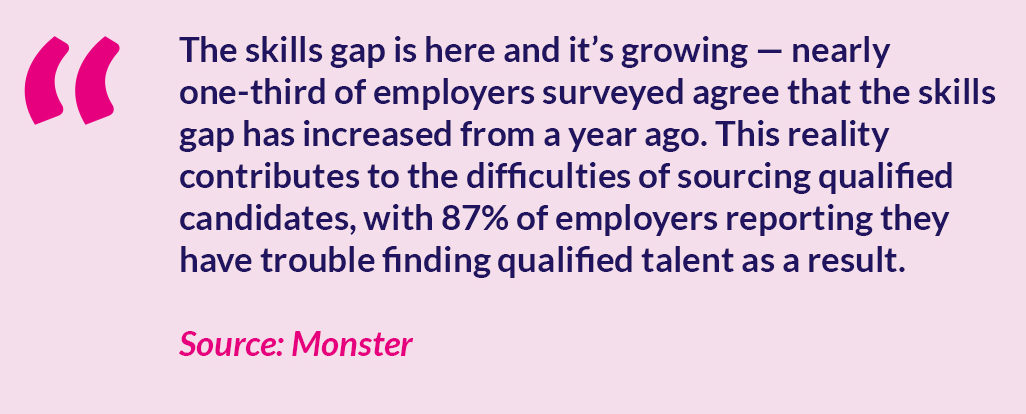Topics: Recruitment, Talent Advisory
8 Tactics Staffing Agencies Can Employ to Overcome Skills Shortage
Posted on December 17, 2021
Written By
Aron Vaidya

Introduction
Finding top talent for their clients has been a growing challenge for staffing agencies that predates COVID. With a falling unemployment rate (currently at 4.3% according to Statista) and increasing hard-to-find skill demands, major businesses are hard-pressed to fill their staffing needs.
There are several positions that demand talent with niche skill sets. Many employers could relax their stringent requirements during pre-screening and recruit the best-fit talent. This exercise would make recruiters’ life more manageable.
In the meantime, today’s staffing agencies must be inventive in their tactics to solve the talent shortage and find the candidate with the right mix of skills and work experience. Here are 9 tactics staffing agencies can embrace to overcome skills shortages in the UK.
- Balancing Clients’ Job Requirements Expectations
Skill shortage has severely impacted all businesses, including agency clients; however, staffing agencies must still define and communicate criteria around fulfilling client needs for required best-fit talent. When specific geography, industry, or skill set experiences a talent gap, agency recruiters must communicate the same to clients and highlight the challenge they face in talent sourcing and recruiting suitable candidates for required job requisitions.
This situation would manifest when the clients insist on accepting candidates from agencies that must meet the list of must-have requirements. In such a scenario, if agencies attempt to meet all the client-defined job requirements, it may result in a recruitment process that becomes counter-productive, resulting in an unhappy client that does not accept the current talent reality. Staffing agencies must communicate to clients that they must find the right balance and be slightly flexible about the defined job requirements if they want to find the right talent for the essential positions amidst this new talent reality.
- Educate Clients about Current Market Condition
Before offering services to clients, staffing businesses must educate clients about the current complexities and realities of the jobs market. This requires agency recruiters and leaders to have in-depth knowledge about the labour market specific to clients’ expertise.
The clients may relax their requirements if they can provide this information backed by factual data. For instance, if engineering clients are provided with numbers on a low percentage of unemployment or limited availability of candidates around specific geography, they might be more receptive to change.

- Learning & Development to Fill Gaps from Within
Businesses have prioritised upskilling and cross-skilling their existing workforce through customised training programmes intending to address skill gaps from within. This means offering in-house training with support from a knowledgeable management team with expertise in a specific niche. It’s an excellent method to make the post of the talent pool at disposal and maximise their value with increased time and cost-efficiency.
Another option to opt for is taking support from external training institutions. Many organisations offer financial support and incentives to employees as they enrol for courses enabling them to upskill their current skillsets. This process, although more time-consuming, is beneficial in the long run as it ensures that the workforce receives industry-quality training.
- Focus on Growing Recruitment Network
If not done already, now is the time to build a recruitment network across multi-channel platforms to better cope with talent shortages. Candidates have been using social media and virtual networking platforms expansively to seek new job opportunities. Agency recruiters must make the most of this presence to engage, and possibly, source to build a rich talent pool and improve recruiting efficiency.
Forward-thinking recruitment leaders have already started making huge investments in this direction as they recognise the value a sustained social networking effort will bring to their business.
- Research to Identify Areas with Maximum Growth Potential
One of the most efficient growth strategies for any business is identifying key growth areas through thorough research. As part of talent mapping and/or market mapping service, staffing agencies can enable clients to identify their future needs, better understand their industry, and help them take proactive steps towards short-term and long-term growth.
Whether the need is for a growth strategy around specific geography or focuses towards a particular sector, staffing agencies can help you identify and fulfil the talent need, whether it is for temp, perm, or contractual workforce.
- Source Talent Proactively
The best candidates are hardly on an active lookout for new opportunities. You may not find them on job portals, nor will you be able to attract them through job posts. However, recruiters may entice them to move on to a better opportunity by playing their cards right. Agencies must find and adopt new, efficient ways to source and attract passive candidates.
Building a rich talent pool of diverse, best-fit passive (and active) candidates with a high-touch communication approach is one way to go about it. Being part of talent communities, social channels, and developing referral networks are some of the best practices to help you unlock fine talent even in the current labour market ailing with talent shortages. Praactice candidate sourcing will help you a lot in the long run!
- Use Contingent Workforce
Over the years, one of the most effective ways to combat uncertainties or emergencies has been using a contingent workforce. With support from freelancers and contract workers, you can efficiently address immediate gaps in your organisation. The niche expertise, operating flexibility, and delivery of work within a pre-defined timeline and budget make contingent workers an attractive option for organisations.
Working with a contingent workforce to fulfil immediate needs is an effective tactic that agencies can employ amidst the current talent war.

- Make Use of Global Talent with Smart Outsourcing Support
As the clients endure talent shortage challenges, so do staffing agencies. Outsourcing recruitment process (all aspects or part of it) to sourcing partners can help agencies attain operating flexibility, allowing them to scale up or ramp down offshore teams based on business and market demands. It also gives them access to widespread, untapped talent worldwide and scale their service delivery capability while also narrowing the skills gaps within.
Agencies can also outsource the mid-office and back-office processes and enable the onshore team to focus solely on revenue-generating activities. Recruitment Process Outsourcing support allows staffing agencies to address skills shortage challenges and keep growing even amidst uncertainties.
Closing Lines
The skills shortage has been one of the recruitment industry’s biggest challenges in recent years. Add to this, the pressure to ensure business continuity amidst uncertainties, adapt to operate in changing market conditions without compromising service delivery quality, and stay relevant and ahead of the competition in the current market scenario. Recruitment business leaders must be proactive in their efforts and take the right steps to overcome skill shortage challenges.
Book a Consultation
We hope you enjoyed reading this blog. If you want our team to help you resolve talent gaps, reduce costs and transform your business operations, just book a call.
Originally published Dec 17, 2021 12:12:36, updated Feb 05 2024
Topics: Recruitment, Talent Advisory









